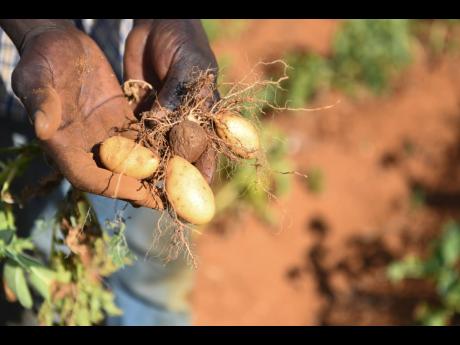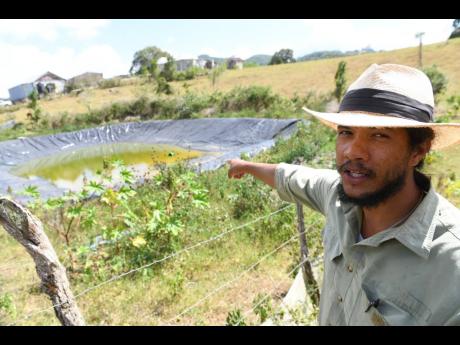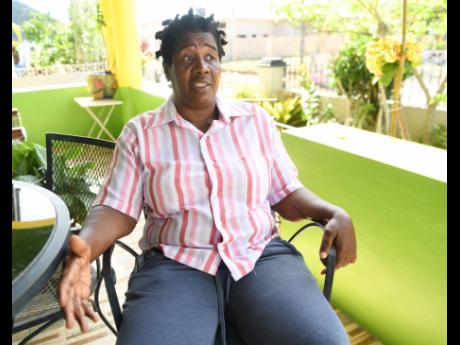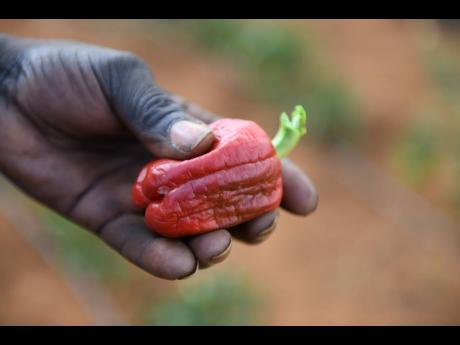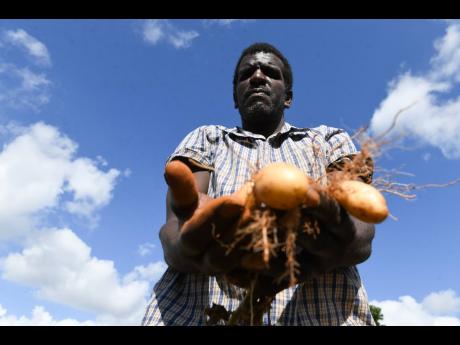Dry cry - Manchester farmers losing millions to drought amid COVID-19 fallout
Farmers in Manchester are battling on two fronts – a near five-month drought that has ravaged crops, leaving them reeling from millions of dollars in losses made worse by the closure of dozens of large hotels from the impact of COVID-19.
In Christiana, for example, famed for its usually high production of Irish potatoes and sweet peppers, the ground was scorched by the heat of the afternoon sun.
And even though the Meteorological Service of Jamaica has forecast that farmers may see some relief, starting in May, when consistently wet weather is expected, it may be too late for cultivators to find redemption.
“The best hope is really when the rainy season starts, so our biggest hope for the farmers is to get over the last of this dry season,” Evan Thompson, who manages the Weather Branch of the Met Service, told The Gleaner last night.
The meteorologist said that there were projections for above-normal rainfall over the next few months.
However, much of the island will continue to face the fire of the sun, a reality that pains Rohan Roberts, the owner of a 40-acre mixed farm in Chudleigh. His fields have been severely impacted by the dry spell as the region is no longer getting historical levels of rainfall. COVID-19, the viral disease that has shuttered markets worldwide and slowed the engine of commerce, has practically decimated any chance of a quick recovery.
“We plant potatoes, carrots, sweet peppers, tomatoes, and pumpkins, and I can tell you, it’s all a loss,” said Roberts. “Everything has wilted in the heat for the lack of water.”
Further, he noted that the community sometimes receives water from the National Water Commission (NWC) systems, but those flows are so infrequent that it has contributed to his investments going bust.
“Right now, it’s crazy. There’s nothing here to sustain the crops or the animals. Because of the drought, we have lost several of our crops and several heads of cows and goats,” he said.
Roberts, 28, operates one of the largest farms in the area. He took over the operations when his father passed away last August.
Potato farmer Hansel Peart lamented that he has already lost at least $2 million in potatoes alone. When combined with tomatoes, and an irrigation system he has started building out, his expenses have spiralled beyond $3 million.
“The food cannot reach maturity. They are dying in the ground, and now that I am trying to put in an irrigation system, the funds a beat me,” Peart said, adding that he had planted 60 bags of potatoes that have all withered.
The persistent drought has also forced Peart to lay off the seven workers on his farm.
It is the same story for Lillian Maitland and Nero Bernard, who have planted potatoes and other provisions, including pumpkins.
Maitland said the drought has devastated the 20 bags of potatoes she has put in the ground.
“Everything is dead, dead, dead, dead. I don’t think I will even get seeds out of it. It is that bad,” she said.
Maitland said she never got around to signing up for the compassionate grant under the Government’s CARE Programme, a welfare initiative that offers support to Jamaicans affected by economic fallout from the ongoing COVID-19 pandemic. She has so far lost upwards of $60,000 to the drought.
More than $200 million was allocated to the Ministry of Industry, Commerce, Agriculture and Fisheries for the benefit of farmers like Maitland.
“By the time I tried getting logged on to the website to get the application in, it was closed off, and it’s not me alone. Farmers are struggling,” she said.
Agriculture grew by around three per cent in the last quarter of the 2019 calendar year, but with the collapse of tourism channels for the offloading of produce, the drought could compound the crisis.
Bernard, who sat in the back of a pickup truck parked along the roadway, complained that he, too, has suffered badly in the absence of water.
He said that the 25 bags of potatoes planted are now dust in the ground - all dried up.
Bernard has called for the Government to arrange an emergency water-distribution scheme to help farmers recover from what he said is “the worst drought in living memory”.

